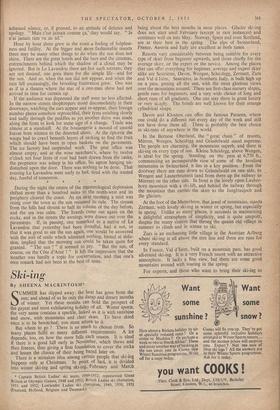Deep Depression
T, HE notice outside the waterfront café was pathetically eloquent: "Service a l'interieur." It was raining on the C6te d'Azur. It was no isolated phenomenon. If the newspapers were to be believed, the whole of Europe was in the grip of weather which, for August, could be considered severe. But while in London or Paris or Berlin, it had meant little more than the carrying of umbrellas and the modification of week-end plans, on the Cote d'Azur there had fallen a gloom and a chill which gave the lie to the promises of the travel agents and ,made nonsense of the brochures of the Syndicats d'Initiative.
The comment of the facteur as he produced the letters from inside his dripping oilskin was briefly to the point : " Le temps est devenu fou." From the Pyrenees to the Alps all reasonable forecasts 'had been confounded, all precedent overthrown. From Cannes to Menton and beyond, from Les Iles d'Hyeres to St. Tropez, the pleasure boats were hugging the harbour walls and heavy clouds lay low across the hills. At Monte Carlo the beach was deserted. At Villefranche the streets were almost empty. And at Nice, " Jewel of the Southern Coast," a wind from the sea was driving the waves against the promenade, sending the poor to their boarding houses and the rich to the refuge of the Negresco lounge.
At no point on the coast could the weather have caused any satisfaction, but at Le Lavandou (population 1,162 h; ' sta. baln. et hiv.' in Michelin) it brought a dismay and a dis- organisation which quite overwhelmed the little town. The rain fell upon a region unprepared and unwelcoming. It fell upon the red rocks where, the day before, people had been sunning themselves in between expeditions at peche sous- marine. It fell upon the gaily-coloured beach tents, upon the white walled villas and the cushions left lying on the lawns; upon the jasmine and the oleanders and the geraniums in the blue window-boxes. It beat through the pine trees and stirred the needles in their shade; beat upon the rocks and made the lizards scuttle for shelter in the crevices and thick undergrowth; and, higher up, where the ripening vines were watched over by the cypress trees, it fell upon the brown earth so that the dried-up drainage channels began to run' again. The rivulets flowed into the gulliei, the gullies into the bed of the stream, and the stream flowed down to the coast, gushed out from its grating at the end of the little promenade and sent a great brown stain spreading slowly out to sea.
Although the rain had begun falling long before dawn, neither natives nor visitors had dressed appropriately, for there had been no popular belief that the outrage would persist. Now, when luncheon was already being served, the cafés were crowded with those who had been exiled from the beaches and whose picnic baskets impeded the waiters' feet as tray after tray of coffee and cakes were brought : " One could not just sit there without having something." So they sat, toying with unwanted delicacies, subdued and shivering in shorts and slacks and open-neck shirts, wet from their dashes through the downpour, filling the atmosphere with a scent of sodden misery. It was a misery which was compounded of disappointment and frustration and, clearly identifiable above all else, a hurt and bewildered unbelief. It was a misery which ousted initia- tive and decision, leaving only a sad and confused uncertainty. The waiters and the barmen and the longshoremen were asked for their views, and, knowing well that they were expected to give expert and cheerful reassurance, they had at first obliged. "Ca ira," they would say, nodding towards the sea and the sky, " Ca sera vite passé," as a doctor still groping for his diagnosis might seek to placate the fears of a nervous patient. But as the day wore on without any lightening of the skies they too began to betray a deep concern. Their manner changed from bluff confidence to uneasy doubt, and then to ashamed silence, or, if pressed, to an attitude of defence and apology. " Mais c'est jamais comme ca,' they would say. " Je n'ai jamais rien' vu de tel."
Hour by hour there grew in the town a feeling of helpless- ness and futility. At the bigger and more fashionable resorts there may be many other things to do when the sun does not shine. There are the great hotels and the bars and the cinemas, entrenchments behind which the shadow of a cloud may be ignored. But in Le Lavandou there are few such retreats; they are not desired; one goes there for the simple life—and for the sun. And so, when the sun did not appear, and when the rain fell unceasingly, the brooding frustration grew. One was as if in a theatre where the star of a one-man show had not arrived in time for curtain up.
If the audience was depressed the staff were no less affected. In the narrow streets shopkeepers stood disconsolately in their doorways, watching the cars appear and re-appear, their foreign number plates somehow reproachful, their tyres swishing slowly and sadly through the puddles as yet another drive was made along the front to look for some sign of a change. Trade was almost at a standstill. At the boulangerie a mound of unsold loaves bore witness to the deserted shore. At the epicerie the wasps had to crawl beneath layers of sacking to find the fruit which should have been in open baskets on the pavements. The ice factory had suspended work. The post office was almost empty, and at the wine merchant's, where by twelve o'clock not four litres of rosé had been drawn from the casks, the proprietor was asleep in his office, his apron hanging un- disturbed upon the door. There was nothing to be done. That evening Le Lavandou went early to bed, tired with the wasted day, fearful of tomorrow.
*
During the night the centre of the meteorological depression shifted more than a hundred miles to the north-west and its periphery cleared the coast. At six next morning a mist was rising over the town as the sun resumed its rule. The stream from the hills had shrunk to half its volume of the day before, and the sea was calm. The lizards came out again on the rocks, and in the streets the awnings were drawn out over the pavements. If, in passing, one remarked to a native of Le Lavandou that yesterday had been dreadful, had it not, or that it was .good to see the sun again, one would be answered with the sort of smile which admitted nothing, hinted at delu- sion, implied that the morning sun could be taken quite for granted. " The sun ? " it seemed to Say. " But the sun, of course, on the C6te d'Azur ! " It left the impression that the weather was hardly a topic for conversation, and that one's own remark had not been in the best of taste.



















































 Previous page
Previous page